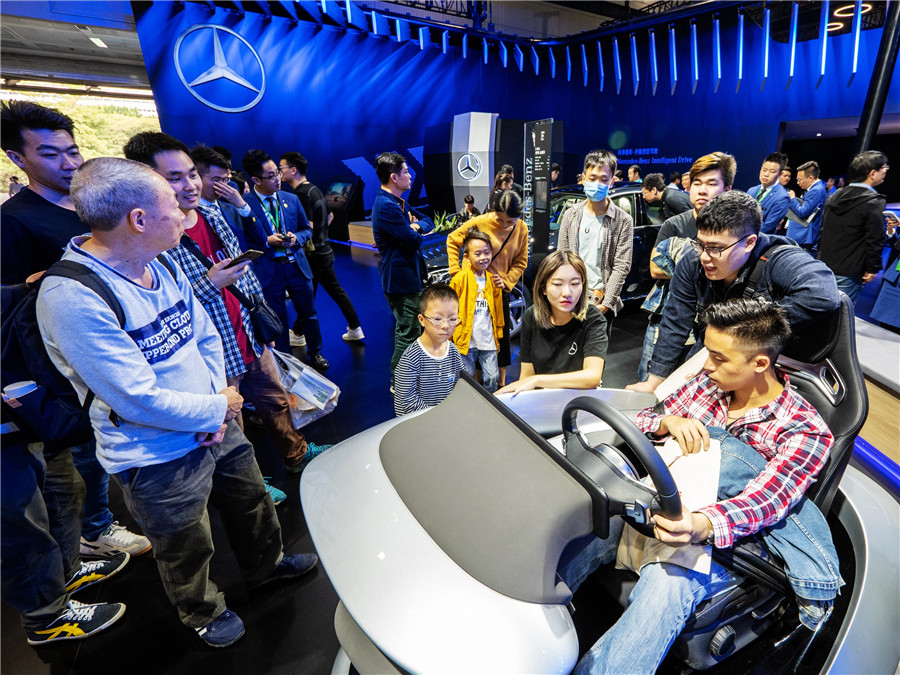Mercedes-Benz's stellar year in premium market


Mercedes-Benz delivered 2.31 million cars worldwide in 2018, which made it the most popular premium brand for three straight years, mainly thanks to its performance in China, said its top executive.
"In a highly competitive environment, we also remained at the top from month to month, thanks to double-digit growth in China and many new models that have delighted both existing and new customers worldwide," said Dieter Zetsche, chairman of Daimler AG and head of Mercedes-Benz Cars.
China was again the company's biggest sales market last year, where 652,996 Mercedes-Benz cars were handed over to customers, up 11.1 percent year-on-year.
The sales came second only to Audi in China. But if combined with its smart brand, the car division of Daimler AG saw its sales reach a record number of 674,125 units, topping the ranks of premium brands in the country.
Its smart brand enjoyed great popularity last year as well, where it achieved its second-best full-year sales since its 2009 launch in China.
Analysts say the results of Mercedes-Benz and smart were extraordinary, considering that car sales in China last year fell for the first time since 1990.
Retail sales of passenger cars saw a decline of 5.8 percent year-on-year to 22.35 million, although it remained the largest car market in the world, according to the China Passenger Car Association.
Mercedes-Benz said the sales were thanks to its strategy of "Made in China, for China", and 70 percent of its vehicles sold in the country were made at its joint venture with Chinese carmaker BAIC Group.
Hubertus Troska, Daimler's board member for China operations, said local production with BAIC is an integral part of Daimler's core strategy in China and also one of the most important factors of its success. The two built their joint venture, Beijing Benz, in 2005, and since then more than two million cars have rolled off its assembly line. It produces five models: the A-Class, the C- and E-Class sedans and the GLA and CLC SUVs.
Analysts expect Mercedes-Benz to have decent results in 2019 as well, as the overall premium segment has kept its momentum and the firm has a bigger lineup of models to come.
Nicholas Speeks, president and CEO of Beijing Mercedes-Benz Sales Service Co, said the company is planning to launch 15 models in the Chinese market this year.
Eased trade tensions between China and the United States are expected to benefit Mercedes-Benz's imports, because some of its most popular SUVs are made in the US.
Mercedes-Benz's first China-made electric vehicle, the EQC, will roll off the assembly line in 2019, as new energy vehicles are gaining momentum.
Earlier last year, Daimler and BAIC announced an investment of 11.9 billion yuan ($1.76 billion) to expand their joint venture and produce models including electric vehicles. Daimler will also build a battery cell plant at its joint venture.
"Electric mobility is one of the pillars of Daimler's future mobility strategy. We are dedicated to bringing this strategy forward globally and especially in China, the world's largest new energy vehicle market already," said Troska.
Globally, Daimler expects sales of battery-electric vehicles to increase to 15-25 percent of car sales by 2025.
- Chinese market boosts Mercedes-Benz sales to reach new record
- Mercedes restructures management in bid to drive local market growth
- Mercedes launches new sedan designed for young consumers
- China's auto imports plunge to historical low in June
- Mercedes-Benz, Maserati to recall nearly 8,000 automobiles in China



































